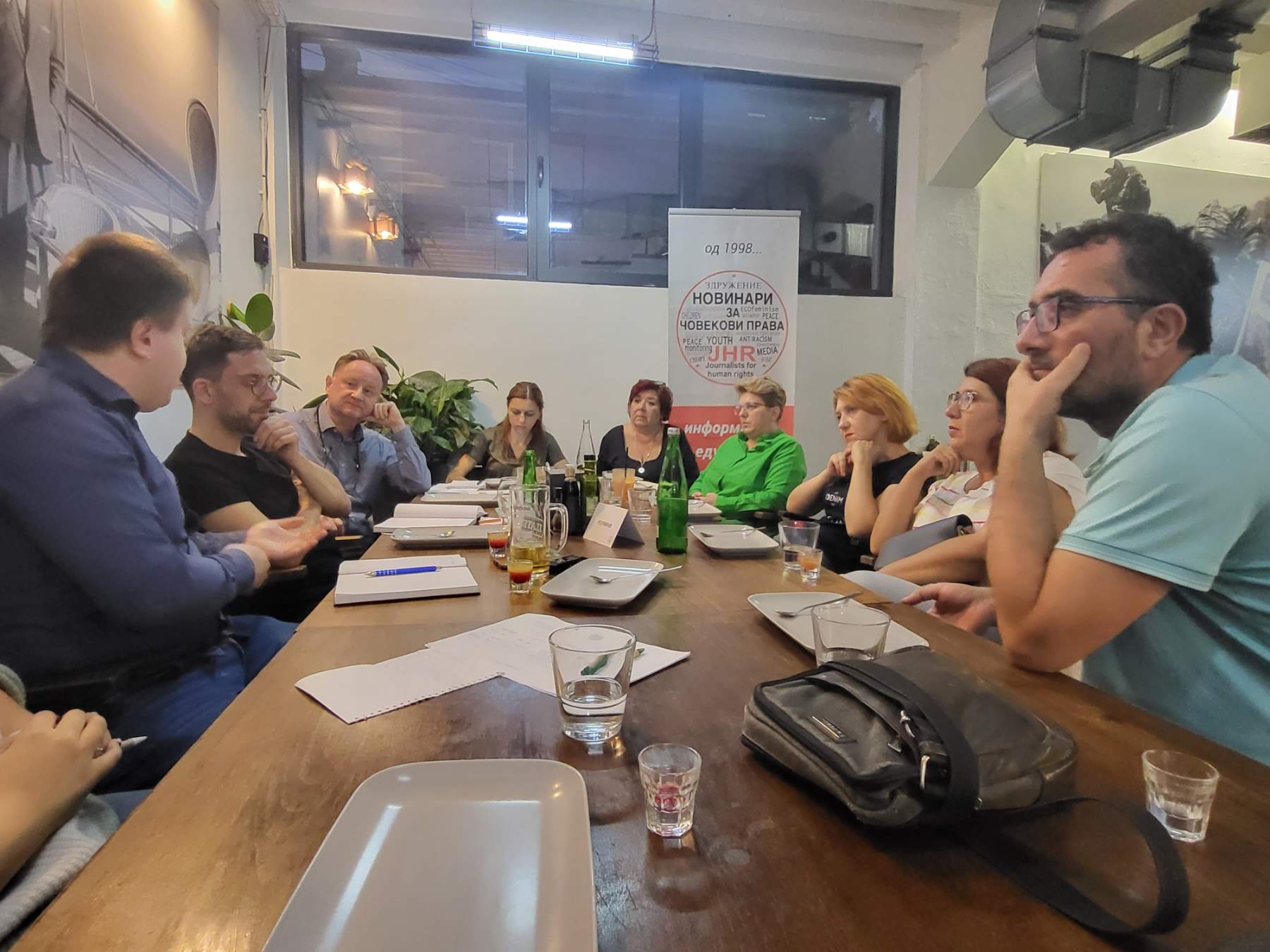Во периодот од 2 до 5 септември 2023 година, во рамките на „Пилот проектот за системот за рано предупредување за исчезнати деца“, имплементиран од Новинари за човекови права, а управуван од партнерската организација ECPAT-Austria, беше реализирана студиска посета. за австриските новинари за градење капацитети и вмрежување и размена на искуства за новинари кои известуваат за социјални прашања и подигање на свеста за проблемот со исчезнатите деца.
Двајца новинари од Австрија, Флоријан Баер, слободен новинар и Мартин Чидерер, новинар од „Дер Стандард“, дојдоа во Северна Македонија на четиридневна студиска посета. Австриските новинари Флоријан Баер и Мартин Цидерер студиската посета ја започнаа попладнето на 2 октомври со вечера за вмрежување со четворица новинари од Северна Македонија, Пелагија Младеновска од Радио Слободна Европа, Елизабета Најдеска од новинската агенција МИА, Соња Делевска од Сакам да кажам – онлајн медиум и Срѓан Стојанчов од ТВ Телма, заедно со австриското аташе Маг. Харалд Фугер од Сојузното министерство за социјални работи, здравство, грижа и заштита на потрошувачите, Александра Радевска, проектен координатор од НЧП и исто така претседателот Филип Спировски, Наташа Доковска и Андреа Накова. Учесниците разменија искуства за тоа како социјалните теми, а особено трговијата со деца и исчезнатите деца се опфатени во медиумите локално, но и регионално, како и каде вмрежувањето би можело да помогне во развојот на приказни во иднина. Се разговараше и за прашањето за пристап до информации и соработка со институциите, како и за активностите што се спроведуваат во Северна Македонија со поддршка на Сојузното министерство за социјални работи, здравство, грижа и заштита на потрошувачите на Република Австрија. Состанокот беше плоден и сите новинари ја споделија подготвеноста и потребата за вмрежување и соработка во иднина за развивање приказни кои придонесуваат за подобрување на безбедноста на децата и јавната свест за темите на исчезнати деца, трговијата со деца и ризиците како сиромаштија, отсуство од училиште, онлајн предатори итн.
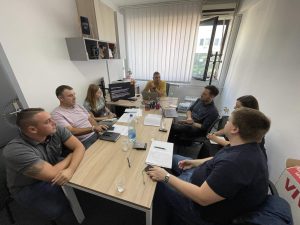 Вториот ден започна со посета на Министерството за внатрешни работи на Северна Македонија, каде австриските новинари беа пречекани од претставници од Секторот за криминалистички истраги, Одделот за сузбивање организиран и сериозен криминал и Единицата за имотен и насилен криминал, Оддел за криминалистичка полиција. Никола Ристовски, самостоен инспектор во Единицата за борба против криумчарење мигранти и трговија со луѓе, Сектор за криминалистички истраги, Отсек за сузбивање организиран и сериозен криминал при МВР ја претстави Националната единица за сузбивање на криумчарење мигранти и трговија со луѓе (наменска група ). Тој ги претстави трендовите и случаите каде што Северна Македонија е дефинирана како транзитна земја поради географската положба, постоењето на организирани криминални групи и мешаните бегалски и мигрантски групи во илегална миграција. Таа е земја на потекло поради економската и социјалната положба, невработеноста, надежта за подобар живот во странство, а како земја на крајна дестинација (жртви на трговија со луѓе) во мал процент, за работа во барови, ресторани, ноќни клубови, сезонски работници, но и присилни бракови, модифициран начин на работа.
Вториот ден започна со посета на Министерството за внатрешни работи на Северна Македонија, каде австриските новинари беа пречекани од претставници од Секторот за криминалистички истраги, Одделот за сузбивање организиран и сериозен криминал и Единицата за имотен и насилен криминал, Оддел за криминалистичка полиција. Никола Ристовски, самостоен инспектор во Единицата за борба против криумчарење мигранти и трговија со луѓе, Сектор за криминалистички истраги, Отсек за сузбивање организиран и сериозен криминал при МВР ја претстави Националната единица за сузбивање на криумчарење мигранти и трговија со луѓе (наменска група ). Тој ги претстави трендовите и случаите каде што Северна Македонија е дефинирана како транзитна земја поради географската положба, постоењето на организирани криминални групи и мешаните бегалски и мигрантски групи во илегална миграција. Таа е земја на потекло поради економската и социјалната положба, невработеноста, надежта за подобар живот во странство, а како земја на крајна дестинација (жртви на трговија со луѓе) во мал процент, за работа во барови, ресторани, ноќни клубови, сезонски работници, но и присилни бракови, модифициран начин на работа.
Неговиот колега Ване Наков, Единица за борба против криумчарење мигранти и трговија со луѓе, Сектор за криминалистички истраги, Оддел за сузбивање на организиран и сериозен криминал, се осврна на размената на информации која добро се одвива преку различни канали како што се безбедните канали на Европол/Интерпол/ Селек во борбата против организираните криминални групи за трговија со луѓе и заштита на жртвите. Како што појасни, забележителен е пораст на софистицираноста на организираните криминални групи.
Баже Димитриовски, главен инспектор во Единицата за имотен и насилен криминал, Оддел за криминалистичка полиција, МВР, даде осврт на организациската единица чиј основен опис и список на надлежности е преземање на активности поврзани со проблемот, пред сè, на исчезнување на лица, вклучително и деца. Единици на МВР кои работат на исчезнати лица се Секторот за меѓународна полициска соработка-потраги, Интерпол, Одделот за сузбивање на организиран и сериозен криминал, сите сектори за внатрешни работи во државата, Одделот за криминалистичка полиција со секторот за општ и насилен криминал. Во таа смисла, Одделот за криминалистичка полиција ги координира активностите заедно со соодветните Одделенија, Одделенија, сите Сектори за внатрешни работи на територијата на Република Северна Македонија за откривање, расветлување, докажување и спречување на овој вид криминал. Спомна и начини за исчезнување на децата: со извршување на кривично дело или со бегање и напуштање на домот. Мотиви за исчезнување на деца поради кривично дело се: противправно лишување и грабнување како основ за изнуда на пари, насилно грабнување дете и посвојување дете од еден од родителите поради проблеми во бракот – развод и распоредување на детето, трговија со луѓе. и други режими. Самоиницијативно заминување и напуштање може да се случи поради незадоволство од семејниот живот на сопружниците, нарушени односи меѓу родителите и децата, забранета љубов, здравствени проблеми.
Тие одговараа и на прашања кои ги имаа новинарите во врска со децата во ризик и кои живеат во несигурни услови, како и за бројот на исчезнати деца и решени случаи, но и за соработката со ЈЧП и како тоа може да помогне и во превенцијата на децата кои исчезнуваат. како што преку различни канали се шири профил на исчезнати лица со цел да се забрза потрагата и успешен исход.
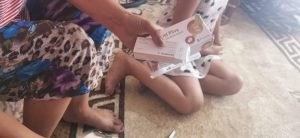 Во попладневните часови новинарите отидоа во теренска посета на неформална населба каде што можеа да разговараат со семејство кое беше дел од студиите на случај спроведени во проектот за да се идентификуваат ризиците од децата да отсуствуваат од училиште и можните ризици од исчезнување. Имаа шанса да се запознаат со социјалните, економските, инфраструктурните предизвици на луѓето во овие населени места и каква институционална поддршка добиваат. Тие беа заинтересирани да дознаат повеќе за активностите што институциите ги преземаат или треба да се грижат за семејствата со лица кои немаат основни здравствени и социјални бенефиции, додека децата одат на училиште или се на пат, но исто така немаат училишен додаток повеќе од две години поради административни банкарски пропусти.
Во попладневните часови новинарите отидоа во теренска посета на неформална населба каде што можеа да разговараат со семејство кое беше дел од студиите на случај спроведени во проектот за да се идентификуваат ризиците од децата да отсуствуваат од училиште и можните ризици од исчезнување. Имаа шанса да се запознаат со социјалните, економските, инфраструктурните предизвици на луѓето во овие населени места и каква институционална поддршка добиваат. Тие беа заинтересирани да дознаат повеќе за активностите што институциите ги преземаат или треба да се грижат за семејствата со лица кои немаат основни здравствени и социјални бенефиции, додека децата одат на училиште или се на пат, но исто така немаат училишен додаток повеќе од две години поради административни банкарски пропусти.
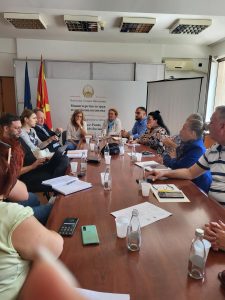 Дел од овие прашања беа тема на дискусијата на третиот ден од студиската посета кога новинарите се сретнаа со претставници од Министерството за труд и социјална политика на Северна Македонија и со претставници и директорот на Јавната установа Меѓуопштински центар за социјални работи на Град Скопје, Изеир Мемеди. Новинарите се запознаа со работата на Центрите за социјална работа кои функционираат на територијата на град Скопје, а се координирани од Меѓуопштинскиот центар и услугите што ги даваат за социјална грижа за семејства и деца на кои им е потребна без родителска грижа. Беше наведено и дека во градот Скопје функционираат три Дневни центри за деца во ризик кои даваат услуги за помош во образованието, здравјето и социјалните навики. Новинарите беа заинтересирани за процесот на соработка меѓу Министерството за труд и социјална политика и другите институции, како училиштата, општината, полицијата во напорите да се спречи децата да го изгубат училиштето или дури и да исчезнат во случаи кога грижата за семејството не е ефикасна, или таму е социјален и економски ризик што може да ги инспирира семејствата да бараат подобар живот во европските земји понекогаш периодично понекогаш трајно. Тие беа информирани и за работата што МТСП ја врши заедно со другите институции кога се согледува ризик од сичезнување на дете, со јавување 24/7 и одење на лице место со интервентните тимови за да се процени состојбата и да се преземат понатамошни активности.
Дел од овие прашања беа тема на дискусијата на третиот ден од студиската посета кога новинарите се сретнаа со претставници од Министерството за труд и социјална политика на Северна Македонија и со претставници и директорот на Јавната установа Меѓуопштински центар за социјални работи на Град Скопје, Изеир Мемеди. Новинарите се запознаа со работата на Центрите за социјална работа кои функционираат на територијата на град Скопје, а се координирани од Меѓуопштинскиот центар и услугите што ги даваат за социјална грижа за семејства и деца на кои им е потребна без родителска грижа. Беше наведено и дека во градот Скопје функционираат три Дневни центри за деца во ризик кои даваат услуги за помош во образованието, здравјето и социјалните навики. Новинарите беа заинтересирани за процесот на соработка меѓу Министерството за труд и социјална политика и другите институции, како училиштата, општината, полицијата во напорите да се спречи децата да го изгубат училиштето или дури и да исчезнат во случаи кога грижата за семејството не е ефикасна, или таму е социјален и економски ризик што може да ги инспирира семејствата да бараат подобар живот во европските земји понекогаш периодично понекогаш трајно. Тие беа информирани и за работата што МТСП ја врши заедно со другите институции кога се согледува ризик од сичезнување на дете, со јавување 24/7 и одење на лице место со интервентните тимови за да се процени состојбата и да се преземат понатамошни активности.
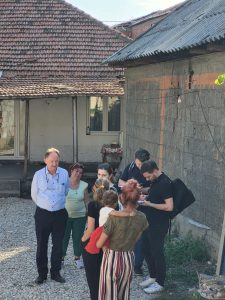 Попладнево новинарите имаа можност да посетат периурбана област на Скопје каде ја слушнаа приказната за семејство во социјален ризик и предизвиците со кои се соочуваат бидејќи сè уште немаат документи иако се родени во земјава како нивните родители, но сега се во процес на нивно добивање. Поради ова, тие немаат социјални бенефиции или здравствени придобивки, немаат образование, како и нивните деца, и немаат начин да влезат на пазарот на трудот освен неформална работа во собирање и сепарација на отпадот, не заработувајќи доволно за основните потреби додека плаќаат за изнајмена соба. Тие исто така објаснија дека има потреба од простори за сместување бездомници и предизвици за наоѓање локација од општините како и долгорочна финансиска поддршка.
Попладнево новинарите имаа можност да посетат периурбана област на Скопје каде ја слушнаа приказната за семејство во социјален ризик и предизвиците со кои се соочуваат бидејќи сè уште немаат документи иако се родени во земјава како нивните родители, но сега се во процес на нивно добивање. Поради ова, тие немаат социјални бенефиции или здравствени придобивки, немаат образование, како и нивните деца, и немаат начин да влезат на пазарот на трудот освен неформална работа во собирање и сепарација на отпадот, не заработувајќи доволно за основните потреби додека плаќаат за изнајмена соба. Тие исто така објаснија дека има потреба од простори за сместување бездомници и предизвици за наоѓање локација од општините како и долгорочна финансиска поддршка.
Студиската посета заврши четвртиот ден со посета на ГО Љубезност – помагање на бездомниците и социјално загрозените семејства и лица, каде новинарите слушаат за различни акции и механизми за помош како бесплатен оброк, помош при добивање правни документи, социјални услуги, домување и навики за штедење, но и подготовка и преквалификација за влез на пазарот на трудот.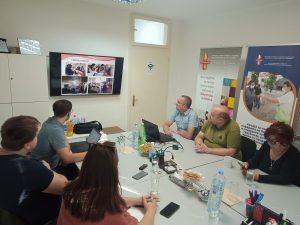
Сите состаноци и дискусии за време на студиската посета им дадоа на новинарите увид во состојбата на семејствата во ризик, како и предизвиците за институциите и пошироката јавност да ги минимизираат ризиците за децата да го изгубат училиштето или дури и да исчезнат. Нивните стории кои ќе бидат развиени за два медиуми во Австрија се со цел да се расветли темата, да се запознае јавноста со ризиците кои понекогаш не се воочуваат како и да поттикне поголем интерес и повеќе простор за социјални теми во медиумите и на локално и на европско ниво. Студиската посета, исто така, ќе даде шанса за вмрежување меѓу новинарите за развивање приказни кои ќе добијат поширок дофат и поголемо влијание.

